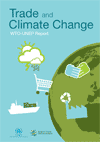June 2009

The WTO/UNEP report on "Trade and Climate Change" examines the intersections between trade and climate change from four perspectives: the science of climate change; economics; multilateral efforts to tackle climate change; and national climate change policies and their effect on trade.
The Report aims to improve understanding about the linkages between trade and climate change. It shows that trade intersects with climate change in a multitude of ways. For example, governments may introduce a variety of policies, such as regulatory measures and economic incentives, to address climate change. This complex web of measures may have an impact on international trade and the multilateral trading system.
The Report begins with a summary of the current state of scientific knowledge on climate change and on the options available for responding to the challenge of climate change. The scientific review is followed by a part on the economic aspects of the link between trade and climate change, and these two parts set the context for the subsequent parts of the Report, which look at the policies introduced at both the international and national level to address climate change.
The part on international policy responses to climate change describes multilateral efforts to reduce greenhouse gas emissions and to adapt to the effects of climate change, and also discusses the role of the current trade and environment negotiations in promoting trade in technologies that aim to mitigate climate change.
The final part of the Report gives an overview of a range of national policies and measures that have been used in a number of countries to reduce greenhouse gas emissions and to increase energy efficiency. It presents key features in the design and implementation of these policies, in order to draw a clearer picture of their overall effect and potential impact on environmental protection, sustainable development and trade. It also gives, where appropriate, an overview of the WTO rules that may be relevant to such measures.
Acceder al documento
No comments:
Post a Comment